There are scores of Palestinian writers and photographers, many of whom have been killed, who are determined to make us see the horror of this genocide. They will vanquish the lies of the killers.
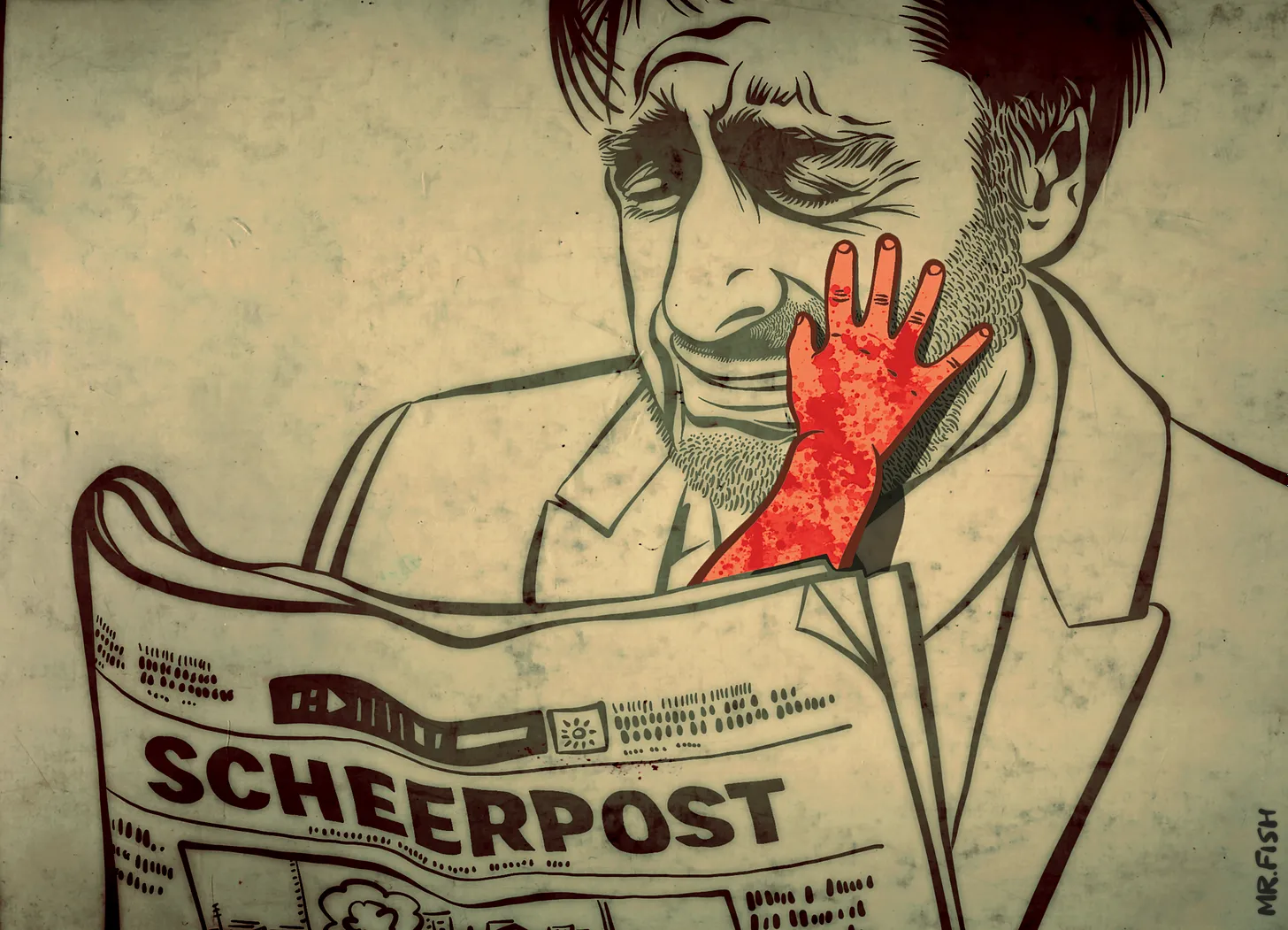
Bearing Witness – Mr. Fish.
 Writing and photographing in wartime are acts of resistance, acts of faith. They affirm the belief that one day — a day the writers, journalists and photographers may never see — the words and images will evoke empathy, understanding, outrage and provide wisdom.
Writing and photographing in wartime are acts of resistance, acts of faith. They affirm the belief that one day — a day the writers, journalists and photographers may never see — the words and images will evoke empathy, understanding, outrage and provide wisdom.
They chronicle not only the facts, although facts are important, but the texture, sacredness and grief of lives and communities lost. They tell the world what war is like, how those caught in its maw of death endure, how there are those who sacrifice for others and those who do not, what fear and hunger are like, what death is like.
They transmit the cries of children, the wails of grief of the mothers, the daily struggle in the face of savage industrial violence, the triumph of their humanity through filth, sickness, humiliation and fear. This is why writers, photographers and journalists are targeted by aggressors in war — including the Israelis — for obliteration.
They stand as witnesses to evil, an evil the aggressors want buried and forgotten. They expose the lies. They condemn, even from the grave, their killers. Israel has killed at least 13 Palestinian poets and writers along with at least 67 journalists and media workers in Gaza, and three in Lebanon since Oct. 7.
I experienced futility and outrage when I covered war. I wondered if I had done enough, or if it was even worth the risk. But you go on because to do nothing is to be complicit. You report because you care. You will make it hard for the killers to deny their crimes.
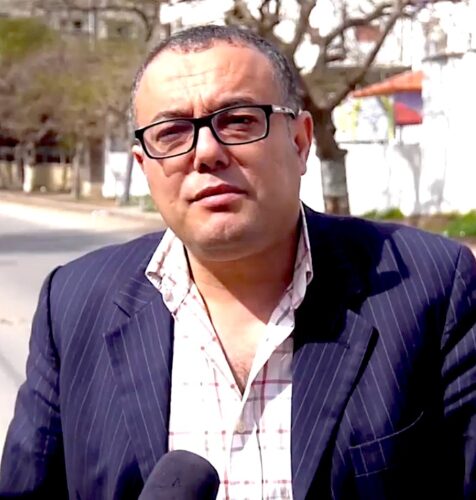
Atef Abu Saif in 2018. (Alebaa News, Wikimedia Commons, CC BY 3.0)
This brings me to the Palestinian novelist and playwright Atef Abu Saif. He and his 15-year-old son Yasser, who live in the occupied West Bank, were visiting family in Gaza — where he was born — when Israel began its scorched earth campaign. Atef is no stranger to the violence of the Israeli occupiers. He was 2 months old during the 1973 war and writes “I’ve been living through wars ever since. Just as life is a pause between two deaths, Palestine, as a place and as an idea, is a timeout in the middle of many wars.”
During Operation Cast Lead, the 2008/2009 Israel assault on Gaza, Atef sheltered in the corridor of his Gaza family home for 22 nights with his wife, Hanna and two children, while Israel bombed and shelled. His book The Drone Eats with Me: Diaries from a City Under Fire, is an account of Operation Protective Edge, the 2014 Israeli assault on Gaza that killed 1,523 Palestinian civilians, including 519 children.
“Memories of war can be strangely positive, because to have them at all means you must have survived,” he notes sardonically.
Refaat Alareer
He again did what writers do, including the professor and poet Refaat Alareer, who was killed, along with Refaat’s brother, sister and her four children, in an airstrike on his sister’s apartment building in Gaza on Dec. 7. The Euro-Mediterranean Human Rights Monitor said that Alareer was deliberately targeted, “surgically bombed out of the entire building.” His killing came after weeks of “death threats that Refaat received online and by phone from Israeli accounts.” He had moved to his sister’s because of the threats.
Refaat, whose doctorate was on the metaphysical poet John Donne, wrote a poem in November, called “If I Must Die,” which became his last will and testament. It has been translated into numerous languages. A reading of the poem by the actor Brian Cox has been viewed almost 30 million times.
If I must die,
you must live
to tell my story
to sell my things
to buy a piece of cloth
and some strings,
(make it white with a long tail)
so that a child, somewhere in Gaza
while looking heaven in the eye
awaiting his dad who left in a blaze—
and bid no one farewell
not even to his flesh
not even to himself—
sees the kite, my kite you made,
flying up above
and thinks for a moment an angel is there
bringing back love
If I must die
let it bring hope
let it be a tale.
Brian Cox reads Refaat Alareer's "If I Must Die".
Alareer, a father of six children, was a well-known academic and writer from #Gaza. He was assassinated last Thursday in an Israeli strike that targeted his sister's apartment in the besieged enclave. pic.twitter.com/OJxaQlwsNS
— Quds News Network (@QudsNen) December 12, 2023
Atef, once again finding himself living amid the explosions and carnage from Israeli shells and bombs, doggedly publishes his observations and reflections. His accounts are often difficult to transmit because of Israel’s blockage of Internet and phone service. They have appeared in The Washington Post, The New York Times, The Nation and Slate.
Please Make Your Tax-Deductible DONATION Today
On the first day of the Israeli bombardment, a friend, the young poet and musician Omar Abu Shawish, is killed, apparently in an Israeli naval bombardment, though later reports would say he was killed in an airstrike as he was walking to work.
Atef wonders about the Israeli soldiers watching him and his family with “their infrared lenses and satellite photography.” Can “they count the loafs of bread in my basket, or the number of falafel balls on my plate?” he wonders. He watches the crowds of dazed and confused families, their homes in rubble, carrying “mattresses, bags of clothes, food and drink.” He stands mutely before “the supermarket, the bureau de change, the falafel shop, the fruit stalls, the perfume parlor, the sweets shop, the toy shop — all burned.”
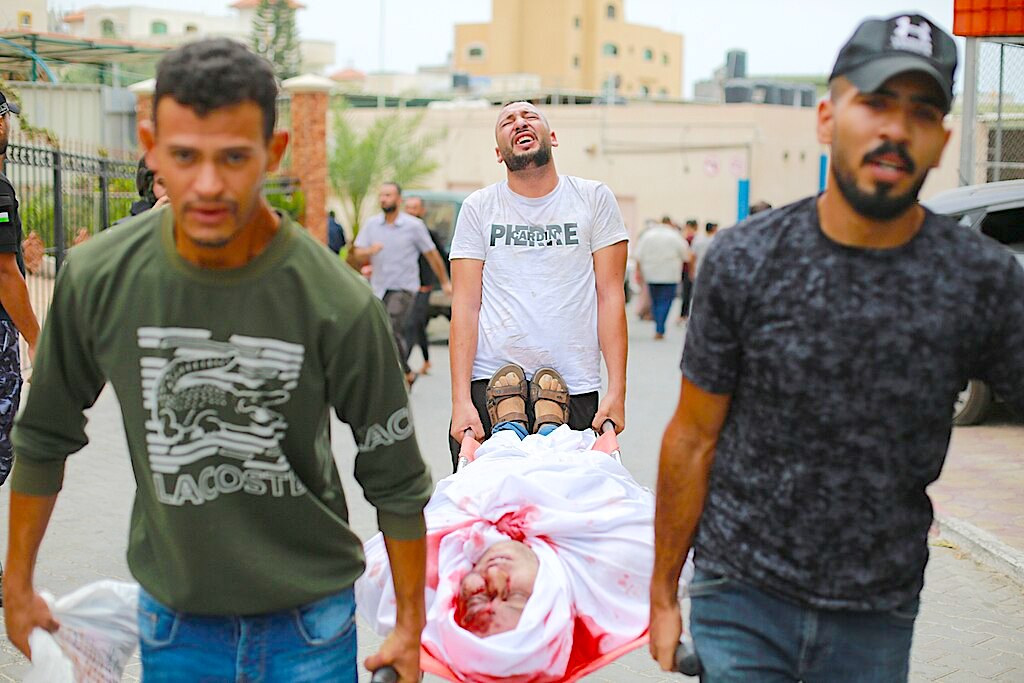
Child wounded by Israeli airstrike in Gaza being transported to the Indonesian Hospital in Jabalia, north of the Gaza Strip on Oct. 9. (Wafa for APAimages, Wikimedia Commons, CC BY-SA 3.0)??
“Blood was everywhere, along with bits of kids’ toys, cans from the supermarket, smashed fruit, broken bicycles and shattered perfume bottles,” he writes. “The place looked like a charcoal drawing of a town scorched by a dragon.”
“I went to the Press House, where journalists were frantically downloading images and writing reports for their agencies. I was sitting with Bilal, the Press House manager, when an explosion shook the building. Windows shattered, and the ceiling collapsed onto us in chunks. We ran toward the central hall. One of the journalists was bleeding, having been hit by flying glass. After 20 minutes, we ventured out to inspect the damage. I noticed that Ramadan decorations were still hanging in the street.”
“The city has become a wasteland of rubble and debris,” Atef, who has been the Palestinian Authority’s minister of culture since 2019, writes in the early days of the Israeli shelling of Gaza City.
“Beautiful buildings fall like columns of smoke. I often think about the time I was shot as a kid, during the first intifada, and how my mother told me I actually died for a few minutes before being brought back to life. Maybe I can do the same this time, I think.”
He leaves his teenage son with family members.
“The Palestinian logic is that in wartime, we should all sleep in different places, so that if part of the family is killed, another part lives,” he writes. “The U.N. schools are getting more crowded with displaced families. The hope is that the U.N. flag will save them, though in previous wars, that hasn’t been the case.”
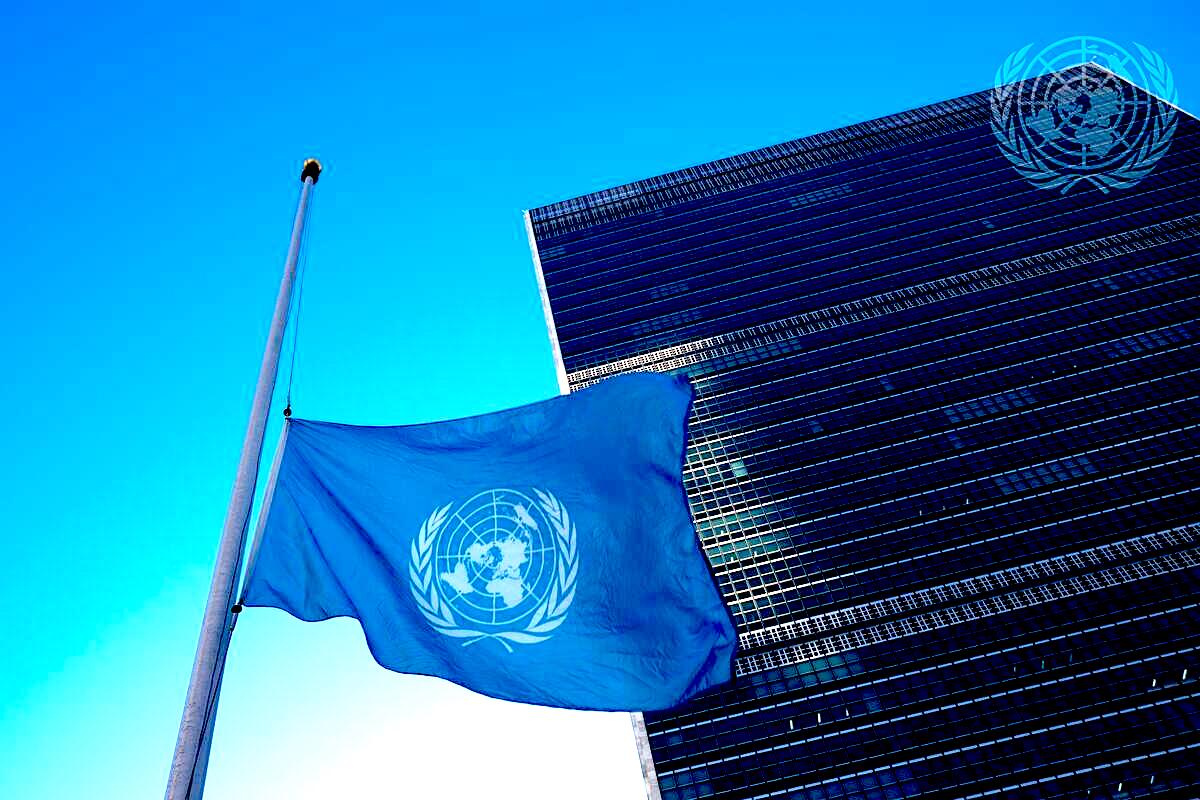
United Nations flag at half-mast at UN headquarters to honour colleagues killed in Gaza, Nov. 13. (UN Photo/Evan Schneider)
On Tuesday Oct. 17 he writes:
“I see death approaching, hear its steps growing louder. Just be done with it, I think. It’s the 11th day of the conflict, but all the days have merged into one: the same bombardment, the same fear, the same smell. On the news, I read the names of the dead on the ticker at the bottom of the screen. I wait for my name to appear.
In the morning, my phone rang. It was Rulla, a relative in the West Bank, telling me she had heard there’d been an airstrike in Talat Howa, a neighborhood on the south side of Gaza City where my cousin Hatem lives. Hatem is married to Huda, my wife’s only sister. He lives in a four-story building that also houses his mother and brothers and their families.
I called around, but no one’s phone was working. I walked to al-Shifa Hospital to read the names: Lists of the dead are pinned up daily outside a makeshift morgue. I could barely approach the building: Thousands of Gazans had made the hospital their home; its gardens, its hallways, every empty space or spare corner had a family in it. I gave up and headed toward Hatem’s.
Thirty minutes later, I was on his street. Rulla had been right. Huda and Hatem’s building had been hit only an hour earlier. The bodies of their daughter and grandchild had already been retrieved; the only known survivor was Wissam, one of their other daughters, who had been taken to the ICU. Wissam had gone straight into surgery, where both of her legs and her right hand had been amputated. Her graduation ceremony from art college had taken place only the day before. She has to spend the rest of her life without legs, with one hand. ‘What about the others?’ I asked someone.
‘We can’t find them,’ came the reply.
Amid the rubble, we shouted: ‘Hello? Can anyone hear us?’ We called out the names of those still missing, hoping some might still be alive. By the end of the day, we’d managed to find five bodies, including that of a 3-month-old. We went to the cemetery to bury them.
In the evening, I went to see Wissam in the hospital; she was barely awake. After half an hour, she asked me: ‘Khalo [Uncle], I’m dreaming, right?’
I said, ‘We are all in a dream.’
‘My dream is terrifying! Why?’
‘All our dreams are terrifying.’
After 10 minutes of silence, she said, ‘Don’t lie to me, Khalo. In my dream, I don’t have legs. It’s true, isn’t it? I have no legs?’
‘But you said it’s a dream.’
‘I don’t like this dream, Khalo.’
I had to leave. For a long 10 minutes, I cried and cried. Overwhelmed by the horrors of the past few days, I walked out of the hospital and found myself wandering the streets. I thought idly, we could turn this city into a film set for war movies. Second World War films and end-of-the-world movies. We could hire it out to the best Hollywood directors.
Doomsday on demand. Who could have the courage to tell Hanna, so far away in Ramallah, that her only sister had been killed? That her family had been killed? I phoned my colleague Manar and asked her to go to our house with a couple of friends and try to delay the news from getting to her. ‘Lie to her,’ I told Manar. ‘Say the building was attacked by F-16s but the neighbors think Huda and Hatem were out at the time. Any lie that could help.’ ”
Leaflets in Arabic dropped by Israeli helicopters float down from the sky. They announce that anyone who remains north of the Wadi waterway will be considered a partner to terrorism, “meaning,” Atef writes, “the Israelis can shoot on sight.” The electricity is cut. Food, fuel and water begin to run out.
The wounded are operated on without anesthesia. There are no painkillers or sedatives. He visits his niece Wissam, racked with pain, in al-Shifa Hospital who asks him for a lethal injection. She says Allah will forgive her.
“But he will not forgive me, Wissam.”
“I am going to ask him to, on your behalf,” she says.
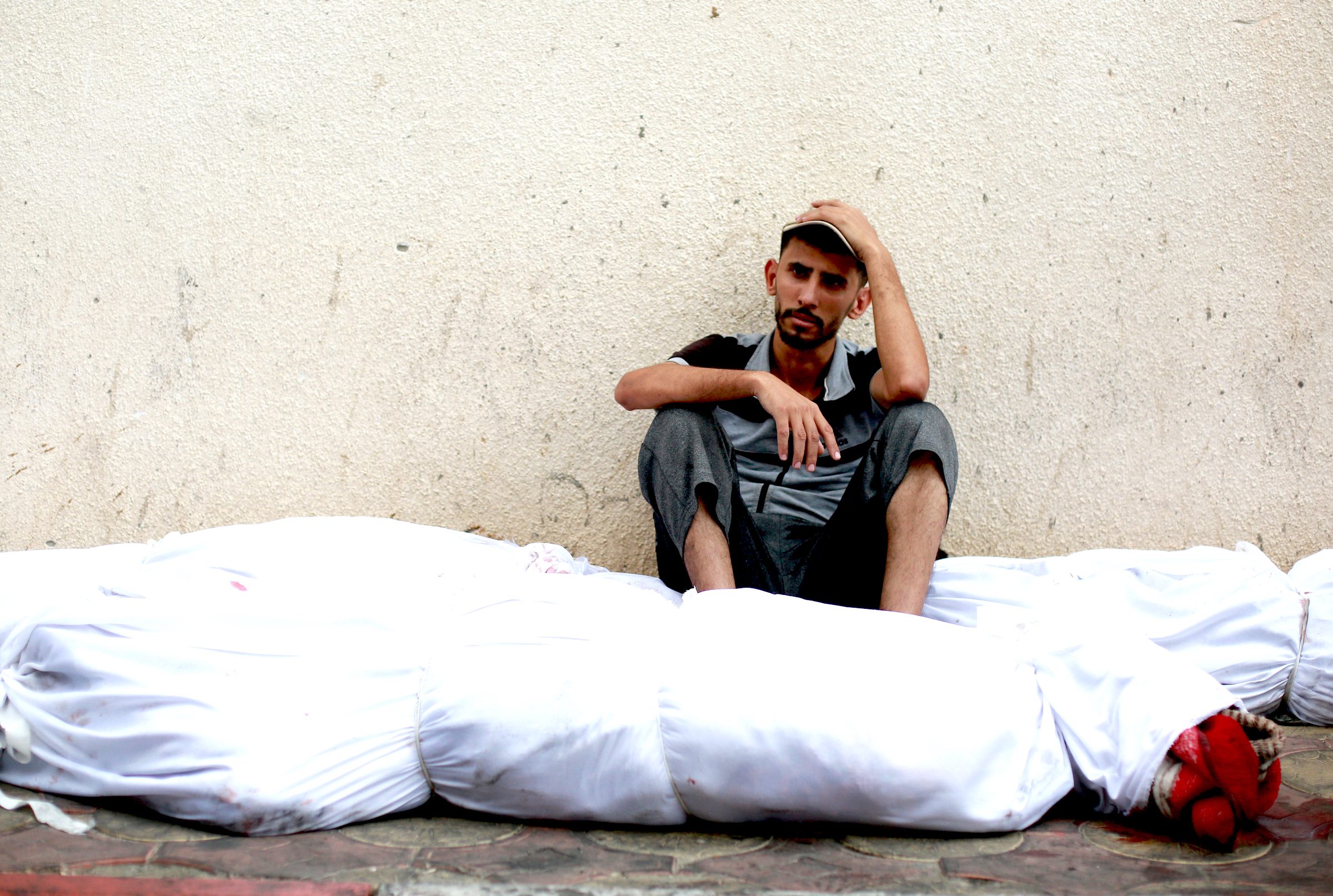
Man with body bags in Jabalia, Gaza Strip, Oct. 9. (Bashar Taleb, Wafa for APAimages, Wikimedia Commons, CC BY-SA 3.0)
After airstrikes he joins the rescue teams “under the cricket-like hum of drones we couldn’t see in the sky.” A line from T.S Eliot, “a heap of broken images,” runs through his head. The injured and dead are “transported on three-wheeled bicycles or dragged along in carts by animals.”
“We picked up pieces of mutilated bodies and gathered them on a blanket; you find a leg here, a hand there, while the rest looks like minced meat,” he writes. “In the past week, many Gazans have started writing their names on their hands and legs, in pen or permanent marker, so they can be identified when death comes.
This might seem macabre, but it makes perfect sense: We want to be remembered; we want our stories to be told; we seek dignity. At the very least, our names will be on our graves. The smell of unretrieved bodies under the ruins of a house hit last week remains in the air. The more time passes, the stronger the smell.”
The scenes around him become surreal. On Nov. 19, day 44 of the assault, he writes:
“A man rides a horse toward me with the body of a dead teenager slung over the saddle in front. It seems it’s his son, perhaps. It looks like a scene from a historical movie, only the horse is weak and barely able to move. He is back from no battle. He is no knight. His eyes are full of tears as he holds the little riding crop in one hand and the bridle in the other. I have an impulse to photograph him but then feel suddenly sick at the idea. He salutes no one. He barely looks up. He is too consumed with his own loss. Most people are using the camp’s old cemetery; it’s the safest and although it is technically long-since full, they have started digging shallower graves and burying the new dead on top of the old—keeping families together, of course.”
On Nov. 21 after constant tank-shelling, he decides to flee the Jabaliya neighborhood in the north of Gaza for the south, with his son and mother-in-law who is in a wheelchair. They must pass through Israeli checkpoints, where soldiers randomly select men and boys from the line for detention.
“Scores of bodies are strewn along both sides of the road,” he writes.
“Rotting, it seems, into the ground. The smell is horrendous. A hand reaches out toward us from the window of a burned-out car, as if asking for something, from me specifically. I see what looks like two headless bodies in a car — limbs and precious body parts just thrown away and left to fester.”
He tells his son Yasser: “Don’t look. Just keep walking, son.”
In early December his family home was destroyed in an airstrike.
“The house a writer grows up in is a well from which to draw material. In each of my novels, whenever I wanted to depict a typical house in the camp, I conjured ours. I’d move the furniture around a bit, change the name of the alley, but who was I kidding? It was always our house.”
“All the houses in Jabalya are small. They’re built randomly, haphazardly, and they’re not made to last. These houses replaced the tents that Palestinians like my grandmother Eisha lived in after the displacements of 1948.
Those who built them always thought they’d soon be returning to the beautiful, spacious homes they’d left behind in the towns and villages of historic Palestine. That return never happened, despite our many rituals of hope, like safeguarding the key to the old family home. The future keeps betraying us, but the past is ours.”
“Though I’ve lived in many cities around the world, and visited many more, that tiny ramshackle abode was the only place I ever felt at home’” he goes on. “Friends and colleagues always asked: Why don’t you live in Europe or America? You have the opportunity. My students chimed in: Why did you return to Gaza?
My answer was always the same: ‘Because in Gaza, in an alleyway in the Saftawi neighborhood of Jabalya, there stands a little house that cannot be found anywhere else in the world.’ If on doomsday God were to ask me where I would like to be sent, I wouldn’t hesitate in saying, ‘Home.’ Now there is no home.”
Atef is now trapped in southern Gaza with his son. His niece was transferred to a hospital in Egypt. Israel continues to pound Gaza with over 20,000 dead and 50,000 wounded. Atef continues to write.

Palestinians in the aftermath of an Israeli airstrike on the El-Remal aera in Gaza City on Oct. 9. (Naaman Omar, Palestinian News & Information Agency, or Wafa, for APAimages, Wikimedia Commons, CC BY-SA 3.0)
The story of Christmas is the story of a poor woman, 9 months pregnant, and her husband forced to leave their home in Nazareth in northern Galilee. The occupying Roman power has demanded they register for the census 90 miles away in Bethlehem. When they arrive there are no rooms. She gives birth in a stable.
King Herod — who learned from the Magi of the birth of the messiah — orders his soldiers to hunt down every child 2 years old and under in Bethlehem and the vicinity and murder them. An angel warns Joseph in a dream to flee. The couple and infant escape under the cover of darkness and make the 40-mile journey to Egypt.
I was in a refugee camp in the early 1980s for Guatemalans who had fled the war into Honduras. The peasant farmers and their families, living in filth and mud, their villages and homes burned or abandoned, were decorating their tents with strips of colored paper to celebrate the Massacre of the Innocents.
“Why is this such an important day?” I asked.
“It was on this day that Christ became a refugee,” a farmer answered.
The Christmas story was not written for the oppressors. It was written for the oppressed. We are called to protect the innocents. We are called to defy the occupying power.
Atef, Refaat and those like them, who speak to us at the risk of death, echo this Biblical injunction. They speak so we will not be silent. They speak so we will take these words and images and hold them up to the principalities of the world — the media, politicians, diplomats, universities, the wealthy and privileged, the weapons manufacturers, the Pentagon and the Israel lobby groups — who are orchestrating the genocide in Gaza.
The infant Christ is not lying today in straw, but a pile of broken concrete.
Evil has not changed down the millenia. Neither has goodness.
Chris Hedges is a Pulitzer Prize–winning journalist who was a foreign correspondent for 15 years for The New York Times, where he served as the Middle East bureau chief and Balkan bureau chief for the paper. He previously worked overseas for The Dallas Morning News, The Christian Science Monitor and NPR. He is the host of show “The Chris Hedges Report.”
NOTE TO READERS: There is now no way left for me to continue to write a weekly column for ScheerPost and produce my weekly television show without your help. The walls are closing in, with startling rapidity, on independent journalism, with the elites, including the Democratic Party elites, clamoring for more and more censorship. Please, if you can, sign up at chrishedges.substack.com so I can continue to post my Monday column on ScheerPost and produce my weekly television show, “The Chris Hedges Report.”
This column is from Scheerpost, for which Chris Hedges writes a regular column. Click here to sign up for email alerts.
The views expressed are solely those of the author and may or may not reflect those of Consortium News.
Please DONATE to CN‘S Winter Fund Drive



dear Chris, this is the saddest article I have ever read about war….that is the young girl, recently graduated from art school, loosing both legs and a hand…..Impossible to fathom such a tragedy…I have an 18 year old granddaughter and cannot imagine such a thing happening to her. Given the hopeless situation, I wish Egypt would take in all the people who wish to leave. May you be given courage and comfort, Chris, to continue your writing. Blessings! May the miracle of peace come to our war weary world!
Thank you Chris Hedges for continuing to cover the worst, and best, of humanity’s work with an artful, unflinching manner that pushes aside the veil of corporate media, and inspires us to act for our future.
Looking at the unspeakable devastation, be reminded that it is not complete. Our own Lindsey Graham exhorted the Israeli government to “level the place”. It is not yet leveled. His South Carolina compatriot Nikki Haley cheered the Israeli’s to “do what you have to do”. These are the near unanimous sentiments of the US Congress. In Satan we trust. Thanks Chris Hedges for providing a conduit to the world on behalf of tremendously brave people.
There is no god that will save us from permanent war for profits of doom based on dominance and superiority as human behavior traits we cherish so much and are provided by the protection racket of the military and weapons technology complex as saviors.
Why can we not make this atrocity stop? Why????
Because the ones who could command an immediate stop do not want to do so in order not to spoil their raking in money business, and they are not us, it is not just a case of when good people do nothing, but good people are powerless against the evil rich, it is all about money, honey?!
Thanks Chris
the mowing of lawns
drought of clear thinking
pulling out the weeds
weeds clear thought
weeds that will save us
of conforming industry
collateral
all of us
capital our industry
Worst of all, all this gut wrenching evil perpetrated by inhumane psychopaths today, yesterday, and in future, cannot, and will not be punished adequately, the evil ones always get away with it, because the rich and powerful are immune to justice, that is why the killing fields will go on and on with impunity somewhere sometime..it is just the nature of existence on this wretched planet, until the final salvation for all existence, the explosion of our sun, the only merciful friend, the end, nirvana at last…for me it cannot come soon enough..
Gaza has had to endure 50.ooo tons of explosives, dropped on civilian targets (as of Dec. 25) – hxxps://english.almayadeen.net/videos/50-thousand-tons-of-explosives-have-been-dropped-on-gaza
every morning we burn a candle and pray for peace and humanitarian aid. be well everyone, you’re in our hearts for ever.
There’s some real slick Zionist propaganda and manipulative distortions floating around and I’m getting a little irritated that otherwise independent media outlets and journalists/intellects have done almost nothing recently to counter it.
Dershowitz, Little Benny Shapiro and some other filth are gaining traction with this gibberish; therefore this must be immediately grabbed by the lapels, thrown down into its chair and told to stuff it.
It goes something like this:
“…For almost 20 years the Jordanians occupied the West Bank and the Egyptians occupied Gaza. Instead of fighting them and establishing an independent Palestinian state, what did Palestinians do? They joined forces with their occupiers and started a war against Israel.
Then after losing the war that they started and Israel getting control over Gaza and the West Bank, all of sudden ‘occupation’ becomes an issue? Why didn’t Palestinians care when Jordanians/Egyptians were the occupiers?…”
This is almost a where to begin?’ scenario. First, Israel plainly started the war. Everyone who’s not a pro-Israel shill realizes that basic point. Israeli officials themselves acknowledge this. Moreover, the Palestinian population did indeed care, rather deeply, about Zionist occupation prior to 1967. These are truisms not worth debating.
The most important thing one must remember in the face of this misleading rubbish is that Egyptian and Jordanian “occupation” was essentially in name only. It was a feeble and spiritless occupation. The entire international community always understood the land was Palestinian and that Palestinians resided on it in profusion! Since c. 1896 when Herzl started his Zionist project, it was rabid Zionists who were continually encroaching and stealing Palestinian districts. The Jewish population of Palestine was roughly 8% c. 1896.
You’ll hear the filthy genocide enablers ask you “who was Palestine’s president?” prior to 1967. This is their supposed gotcha question. Whoa! whoa! whoa! They got us!
It takes the most disgusting, debased and racist liar to argue that Palestinians should have no truck with the Zionist project and that the real villains were always Egypt and Jordan.
All one has to do is read the classic book on this topic, David Hirst’s “Gun and the Olive Branch” (and some other scholarly works) to understand all this.
So many people on the planet right now, if I can take myself as typical, must be turning over in their minds all of the reasons that the events of October 7th took place and the way Israel (albeit led by a gangster allowed to stay in power by perhaps a majority–but not all– of the people of Israel) has chosen to respond to the attack. Among all of the rationales that I have turned over, one seems now–with the apparent inability of the Israelis to stop to their genocidal attack–to have emerged that is not so easy to utter but nevertheless seems to fit the psychology at work at this moment. The key lurks in that terrible phrase, “Never again!” Really? And, if, once again an attack seems an attack on all of the Jewish people, what will you do? What does that phrase imply? Merely that you will not go passively to your deaths without a response? Without fighting back? Or, (more frightening and apropos what we are seeing now) that no response will be too terrible to employ against a perceived enemy? If it is the latter reasoning that is at work, what we are seeing writ large is that–unlike what many decent people would believe–the victim has been so scarred that he is willing to employ the very violence that he suffered. How often has the human response been to tragedy involving violence committed by those who have suffered, “How could he/she do such a thing after having himself/herself been treated so horribly? The Greek dramatists of ancient times understood that “Never again!” must mean that–regardless of the temptation to take revenge–never again will violence be looked upon as a suitable response to crimes committed against us.
As Athena announces to the Furies at the end of the great trilogy, a discourse on revenge never yet matched:
“And we do see
a law that, when one family
gouges out another’s eyes
with hostile sword
or hurls a burning brand,
the sin passes from sight,
is washed away,
and does not carry the odour of long years.
For I proclaim to men,
that they no longer shall learn wrong by wrong;
let them be warned, but not by archaic laws.”
Wonderfully written article that brought a tear to my eyes. We are indeed living in dark times where we are made to witness oppression and genocide inflicted by those who insist on calling themselves good, innocent and righteous and attempting to force everyone else to agree with them. The only consolation is that the scales of deception have finally fallen from the eyes of many people in the world. The people have awoken but many are still afraid to speak out. Now we pray that enough people find inside themselves the courage to stand up against the hypocritical and arrogant evil.